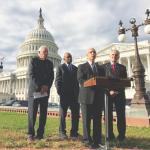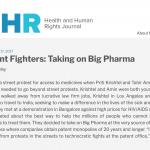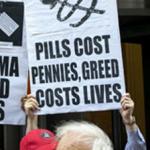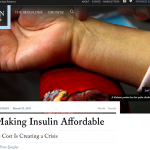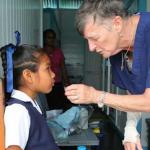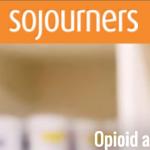PFAM coordinator Fran Quigley published an article in The New Republic, "Building a NASA for Prescription Drugs," about a patent-free, low-cost alternative for robust research and affordable medicine prices.
PFAM coordinator Fran Quigley published a new article about patient advocates for affordable medicines, available in the Washington Monthly.
PFAM coordinator Fran Quigley was interviewed by poet and editor Katy Giebenhain for the United Lutheran Seminary podcast, "The Seminary Explores."
PFAM's coordinator Fran Quigley published a column in today's New York Times about the exciting momentum for drug price reform in many U.S. states. You can read the article here.
This article co-authored by PFAM founders Dr. Chris Stack and Fran Quigley, along with Hoosiers for a Commmonsense Health Plan director Dr. Rob Stone, was published in the Indianapolis Star on January 4, 2018, and subsequently in several other Indiana newspapers. To read the article at its original source, click here.
This article by PFAM coordinator Fran Quigley was published in the Health and Human Rights Journal. To see the article at its original source, with reference sources hyperlinked, click here.
PFAM will be attending Indiana University Robert H. McKinney School of Law Faculty Book Talk. JOIN US. For details, see below or follow the link.
Good news... Now you can do both at the same time! By purchasing a copy of Prescription for the People: An Activist's Guide to Making Medicine Affordable for All (The Culture and Politics of Health Care Work), you can do both at the same time. Author of the book, Fran Quigley, is donating all of his author proceeds to us at People of Faith for Access to Medicine. We are so excited, thank you Fran!
In her final address to the World Health Assembly as Director-General of the WHO, Dr. Margaret Chan identified access to medicines as the most contentious issue of her decade-long tenure. That struggle was engaged, she said, “especially when intellectual property and the patent system were perceived as barriers to both affordable prices and the development of new products for diseases of the poor.”
At first glance, it seems that clinical trials are the much-criticized pharmaceutical industry’s best contribution to the medicines process. The industry leans on governments to fund early-stage research, then claims the patent rights to the most promising fruits of that research.
Drug prices are skyrocketing in the US, and eye-watering Big Pharma profits are rising right along with them. With millions of Americans skipping medicine doses due to cost, widespread public frustration has spurred lawmakers to propose some good ideas for addressing the crisis.
During the January 2003 State of the Union address, President George W. Bush announced the President’s Emergency Plan for AIDS Relief, a landmark treatment program. As Bush spoke, the cameras panned to a smiling guest of honor standing to the right of First Lady Laura Bush. The guest was Ugandan physician Dr. Peter Mugyenyi, and he was an illegal importer of medicines.
Recognizing that access to essential medicines is a moral imperative, the mission of People of Faith for Access to Medicines is to achieve medicines availability as a fully-realized human right. Every child who needs a vaccine should receive it, as should every parent who needs cancer medicines. In pursuing that goal, we are following the lead of long faith and moral traditions and well-settled human rights law.
James Elliott is convinced that the statistics describing the prevalence of type 1 diabetes are misleading. “People say that there is little or no type 1 diabetes in poor countries,” he says. “But that is because all of the people who had it are dead.”
The constant onslaught of news is destabilizing: Immigrants are at great risk of being uprooted from their families. The social safety net, especially access to the basic need of healthcare, is under threat. Aggressive, warlike messages are issued from the highest level of our government.
“OK, but tell us what we would replace it with.”
The response in the online comments section following one of my articles on access to medicines may have been a bit curt, but the point was well-taken. Virtually no one who is not a pharmaceutical corporation CEO likes the current medicines system, with its ever-climbing prices causing deadly access barriers. But the question remains: are medicine patent monopolies and the resulting high patient costs a necessary evil?
The pharmaceutical industry has a massive public relations problem, and it knows it. Even an unapologetically pro-corporate President says drug companies are “getting away with murder.” Americans name prescription drug prices as a top concern, and a January poll showed only 9% of people in the U.S. feel that those companies prioritize patients over profits.
When it comes to providing access to medicines, and access to healthcare overall, we in the U.S. can do much, much better than the Affordable Care Act.
First, let’s give credit where credit is due: the Affordable Care Act represents an improvement in the shameful state of affairs that preceded it. Thanks to the ACA’s expansion of Medicaid and subsidies in health insurance “Marketplaces,” millions of people now have coverage that did not have it before.
Last week, William Easterly, a high-profile global poverty expert and professor of economics at New York University, published an article in Foreign Policy called, “Democracy is Dying as Technocrats Watch.”
In the article, Easterly cited the success of Donald Trump’s disturbing rhetoric and a documented global decline in support for democracy. He laid the blame on “technocracy” being an inadequate response to emotionally-charged messaging.
Are cleverly-branded fishing hats, stuffed animals, and fancy dinners to blame for the U.S.’s raging opioid and heroin epidemic?
Most of us know the breathtaking scope of that epidemic. People are dying of overdoses at a higher rate than ever in our history, nearly 80 deaths every single day. With four of every five heroin users tracing their addiction back to opioids, many of us likely know a loved one or neighbor touched by this tragedy.


